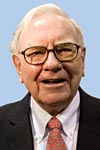
MoneyWeek’s Roundtable experts aren’t at all convinced that this rally is the start of something bigger. But what do other experts think? Tim Bennett rounds up the views of five gurus.
Warren Buffett
Last year was a rare bad one for Warren Buffett. His investment firm, Berkshire Hathaway, saw its largest annual fall in book value – 10% – in 40 years. In 2009’s first quarter, it recorded its first ever loss – $1.59m.
Unsurprisingly, his latest economic assessment was quite bleak. “The economy will be in a shambles throughout 2009 – and probably well beyond.” Buffett, who claims his minimum stock holding period is forever, is more confident long-term. “People will be living far better in 20 years’ time than they are now… but whether that’s true in 20 weeks or 20 months I don’t know.” He tipped US stocks in October 2008, but seems sceptical on the latest rally. Most of it is due to “a secular recovery in certain, recently devastated, sectors”. So bulls beware, “this is by no means the end of uncertainty”.
Russell Napier
analyst and author of Anatomy of the Bear
“If you’re unconvinced by the current market rallies but don’t quite know why,” says FT Alphaville, then bear market historian Russell Napier “is definitely worth some of your time”. Napier compares today’s experience to other huge collapses, such as those of 1921, 1932, 1949 and 1982. Among other things, he looks at two key stockmarket measures: the Tobin Q, a company’s market value divided by the replacement cost of its assets; and the cyclically adjusted price/earnings ratio, which compares share prices to average earnings over ten years.
The bad news is that, by these measures, we have yet to hit the floor. He sees scope for another “run lower to as much as 400 on the S&P 500” (now around 920). The good news is we may not get there until 2014. The trigger for the next big drop will be US Treasury yields hitting 6% due to rising inflation, and China buying less as it starts to see a domestic consumption boom. At that point “the US is in very significant trouble”. But he reckons we’re two years away from that. His advice is to make the most of the rally, then grab a tin hat. “The last Treasury bear market lasted from 1946 to 1981 and there’s no reason to suggest this one will be shorter.”
Crispin Odey
Hedge fund manager Crispin Odey’s European Fund was among the few to profit in 2008, returning 10.9%, partly by shorting banks. He’s still outperforming. This April the same £1.3bn fund leapt 30%. But now he’s been buying up battered banks. He owns 1.5% of Barclays, which contributed nearly all his fund’s 5.27% gain for March.
“I think this is the start of a long bull market,” he tells The Daily Telegraph. The banking recovery will spread to other industries “where capacity has been sufficiently reduced as to allow pricing power to come through”. While some investors may be nervy about the speed of recent gains, he’s impressed. “The last time this happened was the summer of 1982”, when the UK pulled out of recession, setting off a big bull run. He sees history repeating itself.
Hugh Hendry
“How come bonds are my favourite asset class?” asks Hugh Hendry in the FT. The answer, says the Eclectica founder and best-performing European fund manager during the 2000-2002 bear market, is that the world downturn “still has a way to go”. So investors should be “patient and scared”. Hendry believes the world is facing serious deflation, partly because we are “drowning in capacity”, a problem that Chinese plans to build more infrastructure can only aggravate.
Hendry says Fed policy is too conservative: up to $10,000bn may need to be printed to offset “the slump in dollar wealth”. Add in a risk-averse private sector that “refuses to spend” and his conclusion is that bond bears should enjoy it while it lasts. As for the stock bounce, as he told CNBC, we’ve “had a rally in risk. Big deal”.
Anthony Bolton
His Fidelity Special Situations fund clocked up a 20% annual return over a 25-year period compared with 7.7% for the FTSE All-Share index. So why does Britain’s most famous fund manager believe this is the start of a long-run bull market? asks Motley Fool.
Bolton cites three reasons to be cheerful. First, his analysis of relatively recent bear markets suggests “we’ve passed the low point”. Second, he thinks sentiment has not been this poor since the 1970s, a classic launch point for bull markets. A wall of money is sitting on the sidelines that will eventually be launched into riskier assets; money market funds account for half the US stockmarket, against 20%-25% in previous lows. Third, on “many metrics” ranging from price/earnings to price/book ratios, stocks are cheap. So “all the things are in place for the bear market to have ended”. He predicts a rally lasting several years.